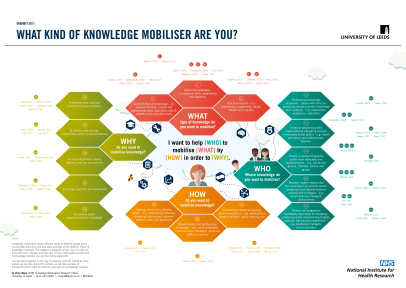This week I’ve been at the 2nd UK Knowledge Mobilisation Forum in Edinburgh. Despite being billed as a UK event I met  Canadians, Africans and Russians, so it was a real international melting pot of all things KM! As you’d expect, we talked about a wide range of things too. From our need to develop a language of love around KM to how we free our minds to become creative knowledge mobilisers. We even had Knowledge Mobilisation: the musical! I came away truly inspired and am sure that some of the ideas and people I met will feature here on my blog over the coming months.
Canadians, Africans and Russians, so it was a real international melting pot of all things KM! As you’d expect, we talked about a wide range of things too. From our need to develop a language of love around KM to how we free our minds to become creative knowledge mobilisers. We even had Knowledge Mobilisation: the musical! I came away truly inspired and am sure that some of the ideas and people I met will feature here on my blog over the coming months.
As well as getting a great opportunity to listen to the knowledge and ideas of my fellow delegates, I also got the opportunity to share some of my ideas about how those of us who are starting out in KM (or have been at it a while) can develop our identity as knowledge mobilisers with a poster and presentation snappily called – “what kind of knowledge mobiliser are you?”
My idea was borne out of my own experiences of starting out in KM. For me, my initial unbridled enthusiasm about knowledge mobilisation slipped into confusion and anxiety as I realised the extent of the literature, the range of contested definitions and the number of different tribes in KM-land. The more I thought about my experiences, the more I realised that what we need isn’t more labels, more terminology or more frameworks, but better and clearer descriptions of ourselves so that we can communicate who we are to each other, find people who are ‘like us’ and find the frameworks and literature that are the most relevant to our work. It’s not about applying these labels to others, but it is about claiming our identity and being confident in who we are. My tentative solution was to use a recently completed review of 49 KM frameworks to develop 4 questions that we can ask ourselves as knowledge mobilisers. Each question maps onto a range of categories which can be used to build a clear description of what kind of knowledge mobiliser you are. You can get a closer look at the poster by clicking on the image, download the handout here and listen to what I said here. At the end of my presentation I handed out postcards and challenged people to tell me what kind of knowledge mobiliser they were.I'd love it if you could do the same, so why not tell me here!
My tentative solution was to use a recently completed review of 49 KM frameworks to develop 4 questions that we can ask ourselves as knowledge mobilisers. Each question maps onto a range of categories which can be used to build a clear description of what kind of knowledge mobiliser you are. You can get a closer look at the poster by clicking on the image, download the handout here and listen to what I said here. At the end of my presentation I handed out postcards and challenged people to tell me what kind of knowledge mobiliser they were.I'd love it if you could do the same, so why not tell me here!
As ever, please get in touch or share your ideas and thoughts in the comments section below. Feel free to use the materials to help you (and others) in your work, but do please let me know what you’ve used them for and if they were helpful.
Oh, and what kind of knowledge mobiliser am I? “I want to help frontline service providers to mobilise their factual knowledge, technical knowledge and practical wisdom by facilitating interactive learning in order to solve practice-based problems.” How about you?

I’d say:
(a) knowledge is context-specific. The way people think and act and use knowledge in different contexts differs. From this it follows that
(b) knowledge mobilisation needs to be context-specific. Different ways of mobilising knowledge are useful and relevant in different settings. I might go a step further and argue that:
(c) what knowledge mobilisers do has to be context-specific. In one setting I might act as a knowledge mobiliser in one way, with one set of aims and understandings and approaches; in a different setting I’ll act differently and be, in effect, a different kind of knowledge mobiliser.
I’d guess most people would be like this: for example, the way we’d approach KM in an outpatient clinic and a police station and a classroom are different. To me this suggests it might be misplaced to identify oneself as a particular type of knowledge mobiliser. We might identify our preferred approach, and no-one can be all things to all people, but a typology of knowledge mobilisers implies we each have a fixed approach – doesn’t it?
LikeLike
Absolutely great point, Iain! I was asked something similar at the forum, about how we avoid the use of ‘labels’ in a negative way. I agree that you may need to be a different kind of knowledge mobiliser in a different setting, and the statement is really designed to build a description of yourself, rather than someone else. I don’t know about you, but I’m lots of different things in different weeks, days and sometimes hours! That’s why this isn’t a ‘typology’ with different labels, but a description of who you are today, in this project, or whatever. I do think that some of the questions I’m suggesting people ask themselves go a bit beyond this, and relate to how they actually see the world – especially the questions about knowledge type. Some people don’t see ‘practical wisdom’ as knowledge, for instance, or might never have really thought about it. So I hope that the questions can at least be used as a starting point to help people build some sense of identity – even if this changes on a regular basis.
LikeLike
“I’m lots of different things in different weeks, days and sometimes hours”:
I would say the same of myself, and I imagine most people would. But your headline “what kind of knowledge mobiliser are you?” implies a more fixed approach.
LikeLike
Novel and very useful framework for conceptualizing our work. Thank you for sharing. I look forward to the responses as we all ‘contextualize’ our work to the needs and resources of our own work settings.
LikeLike
Pingback: Since UKKMbF15? | Cathy Howe
I’ve been at an interesting event over the last couple of days, and we’ve begun to talk about the power of stories in mobilising knowledge. I wonder if what I’ve developed is a way of helping knowledge mobilisers tell their story about who they are and what they do? What do you think, readers?
LikeLike
Pingback: The loneliness of a knowledge mobiliser | KMb Researcher